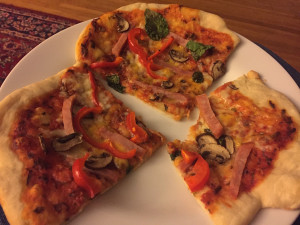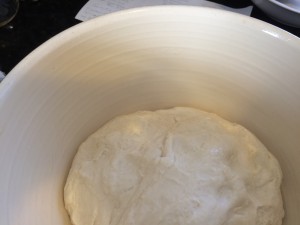This was one of the “level 1” recipes and one of the first in the book. I actually make pizza regularly (or more accurately my husband makes pizza and I prepare toppings). I really like the crust we make, so didn’t want to start the bakes with a recipe I already knew. However there were a few interesting things about the pizza recipe in the book that I wanted to check out.
-The crust was very thin and transferred to parchment paper after being rolled out. Then after being assembled it went on top of a preheated upside-down cookie sheet still on the parchment paper to get that hot surface=good crust pizza magic. We use a pizza stone normally, but that restricts us to one pizza at a time. This time I cooked three pizzas, one on the pizza stone and the other two on the cookie sheets. The results were indistinguishable. Good to know!
– I found the crust good, but I still prefer our whole wheat one for better chew and texture even though thin. And any time I actually prefer the healthier form of something-that is a plus. Here is the link to the recipe in Eating Well that we use (my favorite cooking magazine- I highly recommend it!). http://www.eatingwell.com/recipes/thin_crust_pizza_dough.html
-The sauce on the other hand is my new favorite pizza sauce! I liked it because it was very fresh and clean tasting and still had the sharp taste of the tomato, basil, and garlic. I actually wished I had only put a little cheese on it and no toppings! Next time I will leave a space bare for that. This was also my first UK to US conversion (not counting metric and Celsius, which is simple math) because the sauce made with an uncommon product, at least where I am, called “passata”. It is not tomato sauce, although its texture is similar, because the tomatoes are minimally cooked before processing. It has a sharp fresh tomato taste. While I did find a source for it at the store- it is pricy and a large volume (hint- really good on roasted spaghetti squash that has been mixed with parmesan and a bit of butter). I think that a good substitute I will try next time is to blend up a can of small diced tomatoes that come in sauce- Even though that will have more skin and seeds than  found in passata- it will have the fresh taste and also similar lower sodium than standard pizza sauce. The recipe just cooked it with basil and garlic for a few minutes before using it.
found in passata- it will have the fresh taste and also similar lower sodium than standard pizza sauce. The recipe just cooked it with basil and garlic for a few minutes before using it.
-Finally- the pictures, oops- the pizza was so good we had eaten most of it before I remembered to get a picture! So I just have one of the pieces left on my husband’s plate (mine was empty!).
Next- something sweet- Profiteroles
Bake 2: Pizza
Filed under First 10 Bakes
Bake 1: Focaccia
What to pick first? So many choices. There wasn’t an index list of the recipes, so I went through the whole book writing down the titles and their classification. They are rated by difficulty (levels 1, 2, 3 and star bakes). But in the end, I chose something familiar that I had do ne before- Focaccia and it had the advantage of doing double duty as dinner to go with the nice leek and potato soup I had made. So I lined up everything, including good bread flour (which will have more gluten than standard). One challenge for me was volumes. I’m horrible at guessing volumes as you can tell when I make fruit salad and there are a pile of dirty bowls because I couldn’t tell which one to use! Richard had a great hint of taking a picture on your phone of the dough as a reference for when it has “doubled”, but that works best with a straight edged container, and I have bowls. However, one of the bowl set I have has ridges in it so I got the great idea of putting known volumes of water in it and taking pictures. The first dough was about 750 mls, so I chose the line that was about 1500 mls on the bowl. After an hour when it hadn’t risen enough, so put in my oven that I had put on warm and then turned off to act as a “proofing” drawer. And then I forgot about it until it had way over proofed. That is me in a nutshell. Pretty bright, but easily distracted.
ne before- Focaccia and it had the advantage of doing double duty as dinner to go with the nice leek and potato soup I had made. So I lined up everything, including good bread flour (which will have more gluten than standard). One challenge for me was volumes. I’m horrible at guessing volumes as you can tell when I make fruit salad and there are a pile of dirty bowls because I couldn’t tell which one to use! Richard had a great hint of taking a picture on your phone of the dough as a reference for when it has “doubled”, but that works best with a straight edged container, and I have bowls. However, one of the bowl set I have has ridges in it so I got the great idea of putting known volumes of water in it and taking pictures. The first dough was about 750 mls, so I chose the line that was about 1500 mls on the bowl. After an hour when it hadn’t risen enough, so put in my oven that I had put on warm and then turned off to act as a “proofing” drawer. And then I forgot about it until it had way over proofed. That is me in a nutshell. Pretty bright, but easily distracted.


Still I beat it down and cooked my first two loafs of bread from the book. Good and bad…. The shapes flattened out and I also feel like the holes were two even and small- “too tight” and that may have been due to over-proofing. I keep hearing about over or under proofing- but will need to learn how to recognize it. The good was that the bread tasted amazing. Really! Best ever! Well baked, great crust-firm and crisp without being too tough. The best part was the combina tion of flavor toppings from the book. Green olives (good fat ones without anything in them from the olive bar) fresh rosemary and salt. I only put olives on 1/4 of the bread, as my family doesn’t like olives, but after trying it, my husband wants olives on his next time. They roasted on the bread and really increased the olive oil taste that is at the core of the focaccia taste. That with the fresh rosemary combined to make a rich fragrant flavor. Now that I have tasted for real the first of these recipes, I am convinced even more that I have chosen well and I thrilled to try the next 81 recipes- Next- Pizza!
tion of flavor toppings from the book. Green olives (good fat ones without anything in them from the olive bar) fresh rosemary and salt. I only put olives on 1/4 of the bread, as my family doesn’t like olives, but after trying it, my husband wants olives on his next time. They roasted on the bread and really increased the olive oil taste that is at the core of the focaccia taste. That with the fresh rosemary combined to make a rich fragrant flavor. Now that I have tasted for real the first of these recipes, I am convinced even more that I have chosen well and I thrilled to try the next 81 recipes- Next- Pizza!
Filed under First 10 Bakes
Bake!
And so it begins… I’m an amateur baker who, along with many Americans, has fallen in love with the BBC show “The Great British Bake Off”. I’m not a lover of reality shows, they are often so mean spirited, but this show has a great heart and humor and most of all-the bakes! Yes apparently “bakes” is a noun. I always thought it was a verb, unless prefixed with something like “clam” or postfixed with “sale”. But apparently “bake” is a noun in Britain and one can have good bake, a disappointing bake or even a bake with the famous “soggy bottom”. So I ordered the book BIY by one of my favorite bakers, Richard Burr. I was very impressed with all of the bakers, but Richard had flavors that I particularly thought would taste fantastic and, as a builder, it seemed he might have well organized recipes with good technical detail. When the beautiful book arrived, I thought “I want to bake all the bakes in this book”. And then I said it out loud “I am going to bake everything in this book”. And as I heard that voice, I felt a giddy happy excitement – I am going to cook everything in this book!!! Why not?
I have some strengths going into this
-I’m a scientist- so I hope like a builder, I’m pretty good at trying new things and following instructions and the metric system is my friend.
-I’m not in a rush and have already accumulated many necessary cooking toys.
-Most of all, I’m not afraid of failure- I can always order pizza or pick up a box of donuts.
But I also have some challenges-
-Apparently I don’t really speak English- or at least not all the English in the book. Part of the challenge will be to translate UK to US
-I don’t have time for this! I have at least double booked every minute of my life.
-I can’t eat all of this, I’m desperately trying to lose weight. So I need to give away most of what I make. Still that means I can fuss with food, which is half the fun of eating it.
So I’m beginning this blog expecting, even hoping, that no one will read it. But it is a way to make a commitment, even if it is to imaginary readers. I will bake all 82 bakes in this book! From choux pastry to pizza, puff pastry and pies and lots of fillings. I can’t help smiling.
Filed under First 10 Bakes

